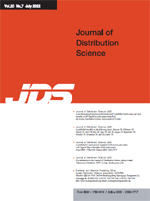A Study on the Impact of E-Service Quality in E-Learning Satisfaction
- 한국유통과학회
- 유통과학연구(JDS)
- 제22권 제12호
-
2024.12123 - 132 (10 pages)
-
DOI : 10.15722/jds.22.12.202412.123
- 8

Purpose: Thisstudy investigatesthe impact of e-learning service quality—specifically content, system, and service quality—on e-learning satisfaction. It further explores the mediating effects of perceived consistency and personalization in the relationship between e-service quality and learning satisfaction, as well as the moderating effects of online learning self-efficacy. Research design, data and methodology: A research model was developed based on previous studies, incorporating hypotheses about the relationships among elearning service quality (content, system, and service), perceived consistency, perceived personalization, online learning self-efficacy, and e-learning satisfaction. Data were collected through surveys administered to e-learning users. Statistical analyses, including regression and mediation/moderation tests, were performed to validate the hypotheses. The collected data were analyzed using Smart PLS and SPSS Macro version 3.5 to test the research model. Conclusion: The results revealed that e-service quality (content quality and service quality) significantly influences learning satisfaction. The mediating effects of perceived consistency and perceived personalization were partially significant. Furthermore, online learning self-efficacy was found to significantly moderate the relationship between content quality and learning satisfaction, emphasizing its critical role in enhancing user engagement and satisfaction.
1. Introduction
2. Literature Review and Hypothesis
3. Methodology
4. Empirical Analysis Results
5. Conclusion
References
(0)
(0)